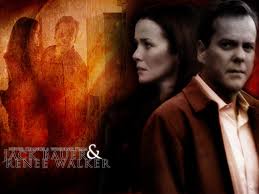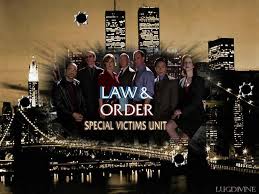Two long-running, influential one-time TV hits bow out Monday night.
Or do they?
"24" will cease to air on Fox, but a big-screen movie is in the works. NBC wraps up the 20-year run of "Law & Order," but executive producer Dick Wolf is shopping the show to cable networks, including TNT.
Regardless of any afterlife for these programs, they will end in their current forms Monday night.
These shows end on episodes that were not necessarily intended to be series finales, but both offer at least some closure.
For "Law & Order" (10 p.m. EDT), the show's two-decade run ties the longevity of "Gunsmoke" and ensures we'll have at least a few more years of crime procedurals with its own spinoffs ("Law & Order: SVU," "Law & Order: Criminal Intent" and, coming this fall, "Law & Order: Los Angeles") and on other networks, most notably CBS's "CSI" franchise.
"Law & Order," which took elements of cop and legal shows and merged them into one program, demonstrated the value of cable reruns that helped spur the popularity of original episodes on NBC -- at least until the show became ubiquitous and oversaturated the market. The series, which employed seemingly every Broadway performer, also proved actor-proof, replacing its leads so often that no one from the original pilot was a series regular for at least 10 years.
But when you think about this series, even though it rarely dealt with its characters' personal lives, some characters made a stronger impression than others. Certainly Lennie Briscoe (Jerry Orbach), Jack McCoy (Sam Waterston), Adam Schiff (Steven Hill), Mike Logan (Chris Noth) and Lt. Anita Van Buren (S. Epatha Merkerson) stand out.
The storyline for Van Buren, who has been battling cancer this season, gets wrapped up Monday night in an episode that goes heavier on the "Order" than the "Law," as detectives track a bombing threat to a Queens high school. Merkerson delivers a moving performance whose subtlety makes a stronger impression than any hysterics could convey.
Some media reports have suggested that "Law & Order" won't get a chance for a wrap-up, but with closure for the Van Buren story, what's left? The show is not a serial and has never spent much time off the job with its characters; if a show ever needed a "finale" less, it's difficult to imagine what that program might be.
"24" could be a different story. Given its original concept -- events occur in real time, hour by hour -- "24" demands closure at the end of every season.
This year the show has been uneven, sinking to ridiculous (Dana Walsh is a mole!) and grotesque depths (Jack guts a guy to retrieve a SIM card!), but rising again in Monday night's two-hour finale (8 p.m.), largely on the strength of emotional performances from stars Kiefer Sutherland (Jack Bauer) and Cherry Jones (President Alison Taylor).
In recent weeks, the "24" writers seemed hell-bent on destroying any shred of goodness left in the character of counterterrorist agent Jack Bauer, sending him on a revenge-filled rampage to take out anyone involved in the murder of Renee Walker or those who inconveniently got in his way.
"Who made you judge and jury?" asks the henchman of former President Logan (the wonderfully oily Gregory Itzin).
"President Taylor when she agreed to the cover-up!" Jack barks back.
Monday night Jack also has a showdown with co-worker and friend Chloe (Mary Lynn Rajskub) as he seeks to kill the Russian president.
Chickens come home to roost for Taylor, a once-upstanding, morally righteous leader who's been brought down -- her character ruined, some credibly argue -- in part by heeding the wayward advice of her Iago-like predecessor.
Jones, in particular, delivers a remarkable final impression as the compromised president. Her rising anger and remorse is palpable and makes Taylor more complicated and sympathetic than the character deserves based on recent plot turns.
The heart of the show remains Sutherland's Bauer, who has his own emotion-filled denouement that tees up the saga's continuation and explains why the in-development "24" feature film will be set outside America's borders.
"There is a final moment that is very, very specific to the series finale," said Howard Gordon, the show's executive producer, who wrote the last hour. "It's not so much a plot moment, but it's a punctuation mark that I think is unique to the series finale.
"I don't think Jack is ever going to recover from what has gone on," Gordon said in a recent teleconference with TV critics. "It just adds to the weight and the complexity and to the darkness of his character. The character has never gone happily-ever-after; that's just not in his wheelhouse. The show is ultimately a tragedy, and you have to really play that and you have to honor that."
"24" leaves a more complicated legacy than "Law & Order." Like "Law & Order," it made its mark on television with its format, but "24" also managed to take a typically female-skewing genre (the prime-time soap) and make it male-friendly. "24" also promoted the emergence and value of TV-on-DVD as a product category and ancillary revenue stream for television production companies.
But "24," which was developed pre-9/11 and premiered weeks after the terrorist attacks, got wrapped up in political and social debates about torture and civil liberties in a ticking-time-bomb scenario. It also introduced viewers to an African-American U.S. president -- David Palmer, played by Dennis Haysbert -- presaging the 2008 election of Barack Obama.
It's significant that "Lost," "24" and "Law & Order" will all end their TV runs this week. All three were TV innovators that brought creativity to the medium and pushed storytelling forward, and those don't come along every TV season.
Or do they?
"24" will cease to air on Fox, but a big-screen movie is in the works. NBC wraps up the 20-year run of "Law & Order," but executive producer Dick Wolf is shopping the show to cable networks, including TNT.
Regardless of any afterlife for these programs, they will end in their current forms Monday night.
These shows end on episodes that were not necessarily intended to be series finales, but both offer at least some closure.
For "Law & Order" (10 p.m. EDT), the show's two-decade run ties the longevity of "Gunsmoke" and ensures we'll have at least a few more years of crime procedurals with its own spinoffs ("Law & Order: SVU," "Law & Order: Criminal Intent" and, coming this fall, "Law & Order: Los Angeles") and on other networks, most notably CBS's "CSI" franchise.
"Law & Order," which took elements of cop and legal shows and merged them into one program, demonstrated the value of cable reruns that helped spur the popularity of original episodes on NBC -- at least until the show became ubiquitous and oversaturated the market. The series, which employed seemingly every Broadway performer, also proved actor-proof, replacing its leads so often that no one from the original pilot was a series regular for at least 10 years.
But when you think about this series, even though it rarely dealt with its characters' personal lives, some characters made a stronger impression than others. Certainly Lennie Briscoe (Jerry Orbach), Jack McCoy (Sam Waterston), Adam Schiff (Steven Hill), Mike Logan (Chris Noth) and Lt. Anita Van Buren (S. Epatha Merkerson) stand out.
The storyline for Van Buren, who has been battling cancer this season, gets wrapped up Monday night in an episode that goes heavier on the "Order" than the "Law," as detectives track a bombing threat to a Queens high school. Merkerson delivers a moving performance whose subtlety makes a stronger impression than any hysterics could convey.
Some media reports have suggested that "Law & Order" won't get a chance for a wrap-up, but with closure for the Van Buren story, what's left? The show is not a serial and has never spent much time off the job with its characters; if a show ever needed a "finale" less, it's difficult to imagine what that program might be.
"24" could be a different story. Given its original concept -- events occur in real time, hour by hour -- "24" demands closure at the end of every season.
This year the show has been uneven, sinking to ridiculous (Dana Walsh is a mole!) and grotesque depths (Jack guts a guy to retrieve a SIM card!), but rising again in Monday night's two-hour finale (8 p.m.), largely on the strength of emotional performances from stars Kiefer Sutherland (Jack Bauer) and Cherry Jones (President Alison Taylor).
In recent weeks, the "24" writers seemed hell-bent on destroying any shred of goodness left in the character of counterterrorist agent Jack Bauer, sending him on a revenge-filled rampage to take out anyone involved in the murder of Renee Walker or those who inconveniently got in his way.
"Who made you judge and jury?" asks the henchman of former President Logan (the wonderfully oily Gregory Itzin).
"President Taylor when she agreed to the cover-up!" Jack barks back.
Monday night Jack also has a showdown with co-worker and friend Chloe (Mary Lynn Rajskub) as he seeks to kill the Russian president.
Chickens come home to roost for Taylor, a once-upstanding, morally righteous leader who's been brought down -- her character ruined, some credibly argue -- in part by heeding the wayward advice of her Iago-like predecessor.
Jones, in particular, delivers a remarkable final impression as the compromised president. Her rising anger and remorse is palpable and makes Taylor more complicated and sympathetic than the character deserves based on recent plot turns.
The heart of the show remains Sutherland's Bauer, who has his own emotion-filled denouement that tees up the saga's continuation and explains why the in-development "24" feature film will be set outside America's borders.
"There is a final moment that is very, very specific to the series finale," said Howard Gordon, the show's executive producer, who wrote the last hour. "It's not so much a plot moment, but it's a punctuation mark that I think is unique to the series finale.
"I don't think Jack is ever going to recover from what has gone on," Gordon said in a recent teleconference with TV critics. "It just adds to the weight and the complexity and to the darkness of his character. The character has never gone happily-ever-after; that's just not in his wheelhouse. The show is ultimately a tragedy, and you have to really play that and you have to honor that."
"24" leaves a more complicated legacy than "Law & Order." Like "Law & Order," it made its mark on television with its format, but "24" also managed to take a typically female-skewing genre (the prime-time soap) and make it male-friendly. "24" also promoted the emergence and value of TV-on-DVD as a product category and ancillary revenue stream for television production companies.
But "24," which was developed pre-9/11 and premiered weeks after the terrorist attacks, got wrapped up in political and social debates about torture and civil liberties in a ticking-time-bomb scenario. It also introduced viewers to an African-American U.S. president -- David Palmer, played by Dennis Haysbert -- presaging the 2008 election of Barack Obama.
It's significant that "Lost," "24" and "Law & Order" will all end their TV runs this week. All three were TV innovators that brought creativity to the medium and pushed storytelling forward, and those don't come along every TV season.







No comments:
Post a Comment